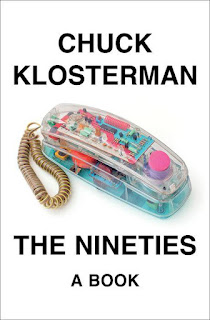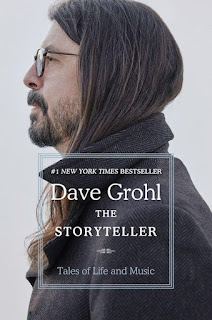Seminal Simpsons scene from Season 7, Episode 24, Homerpalooza, which aired May 19, 1996.
GenX Concertgoer 1: Oh here comes that cannonball guy. He's cool.
GenX Concertgoer 2: Are you being sarcastic, dude?
GenX Concertgoer 1: (startled, then saddened): I don't even know anymore.
That's the nineties in a nutshell, isn't it?
But what I love about Chuck Klosterman's new book, The Nineties, is that he reframes this decade in fascinating ways to show that everything you thought you knew about the 1990s might be wrong — even if you think you remember the decade vividly. He certainly doesn't argue that the nineties was the greatest decade of all time, but he doesn't not argue that either.
I started high school in 1991 and finished college in 2000 (don't do that math lol), so yeah, the nineties were definitely my most formative years. I remember where I was the first time I heard Smells Like Teen Spirit. I saw Titanic in the theater. I borrowed a dubbed cassette of 2 Live Crew's As Nasty as They Wanna Be from a friend and listened to it secretly on my Walkman (sorry, mom, if you're reading this). I was amused by the unreality of The Real World. And for a brief time, I was just as perplexed by the Internet as everyone else. Oh yeah, and of course we had one of those silly see-through phones that's on the cover. (I even bought one as a gag gift for my wife on ebay a few years ago.)
Klosterman handles all these and so much more with the discerning eye of an historian, the coolness of a cultural critic, and the writerly chops of a top-tier essayist. He covers so much ground here, including Ross Perot, Biosphere 2, Friends and Seinfeld, Body Count, Napster, Bill Clinton, the 1994 MLB strike, Crystal Pepsi, Reality Bites, Alanis Morissette and Liz Phair, Pulp Fiction, Michael Jordan, cable news, Garth Brooks, and about a thousand other things. I was surprised at how comprehensive this feels.
Even if you don't always agree with Klosterman's arguments, and there are definitely some not-universally-agreed-upon ideas here, it's still fun seeing him make his case. His main point here is that almost nothing about how we remember the 1990s is how it really was. Still, it's pretty easy to draw a straight line from much of what happened in the 1990s to how things are today, even if things today are very, very different.



